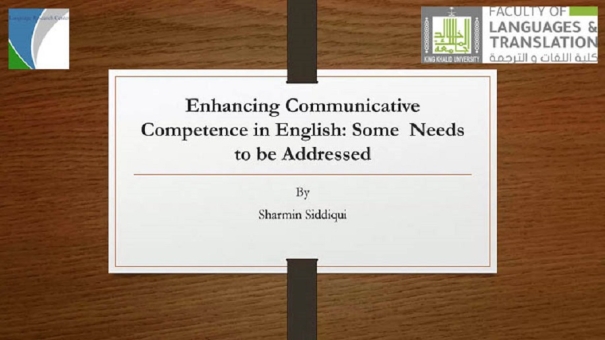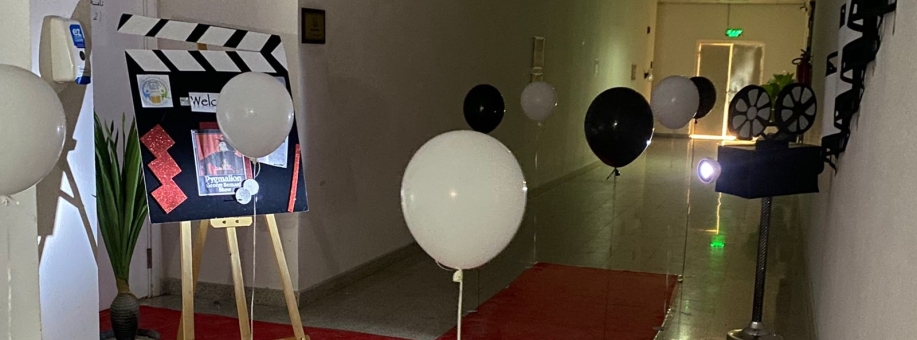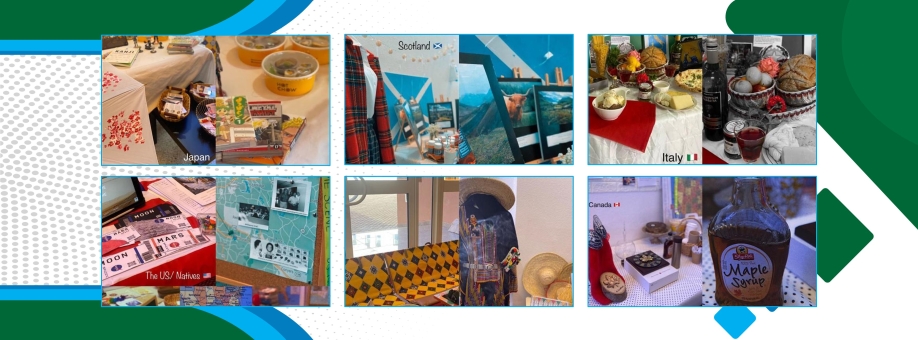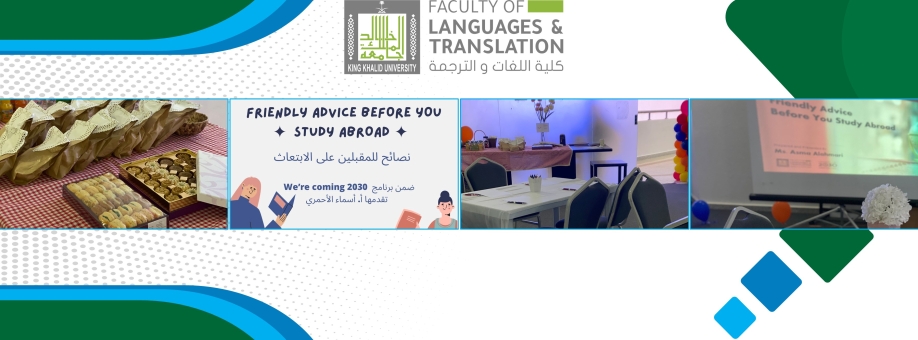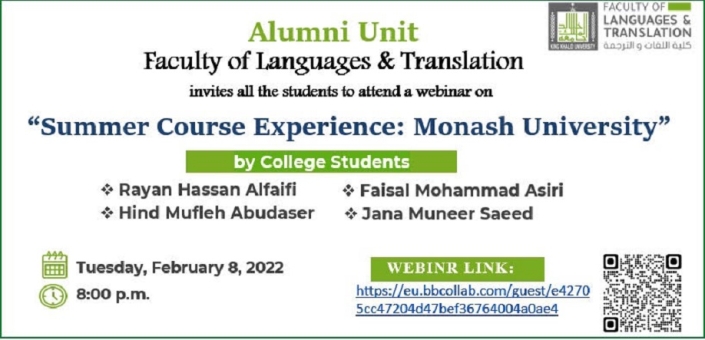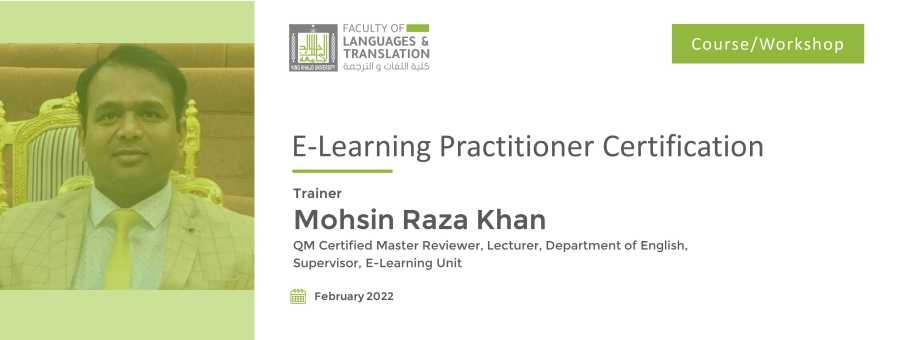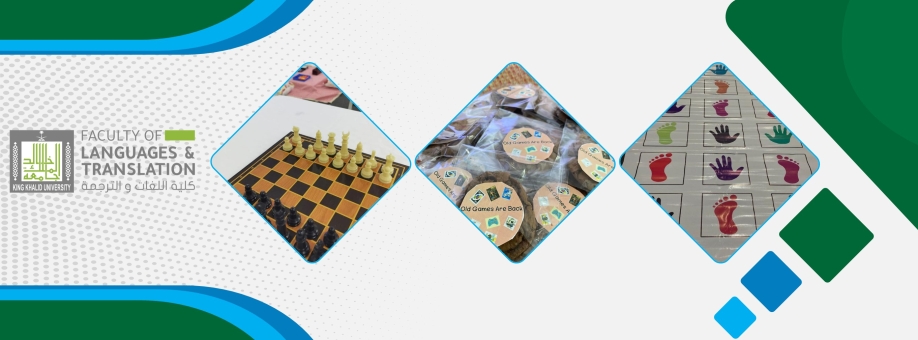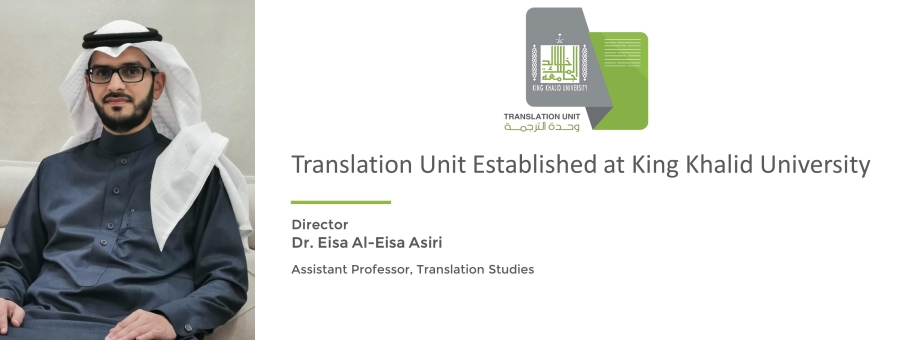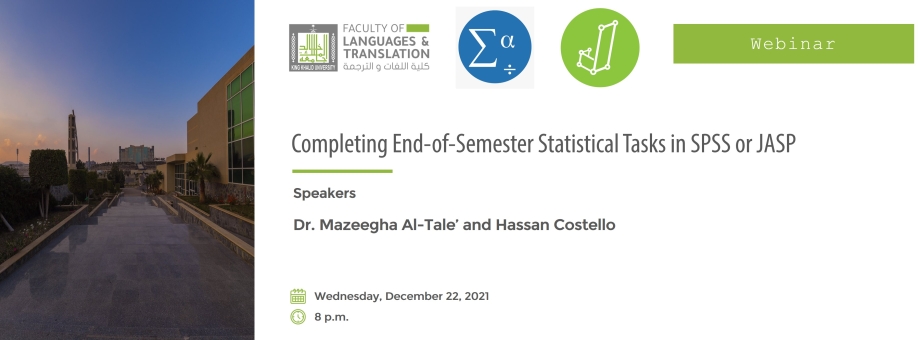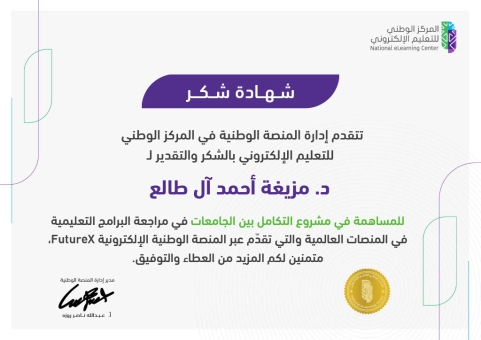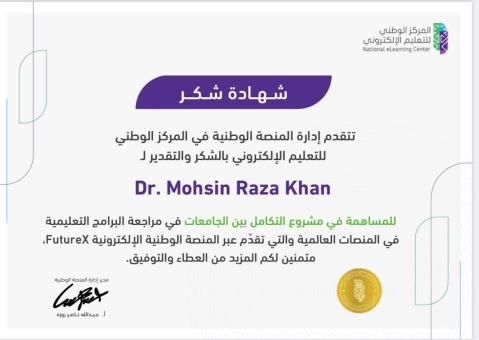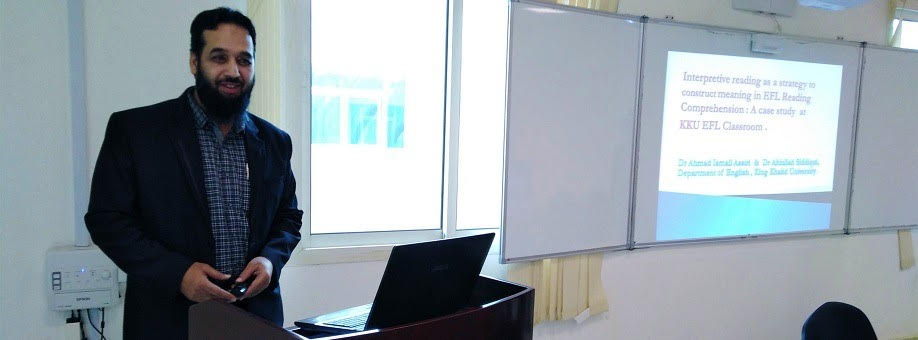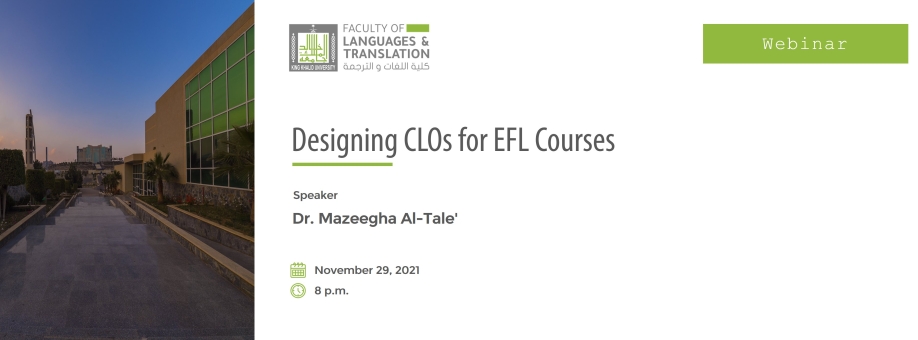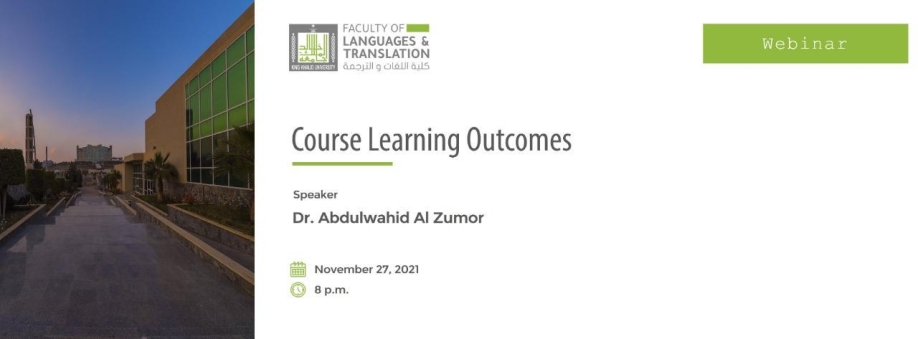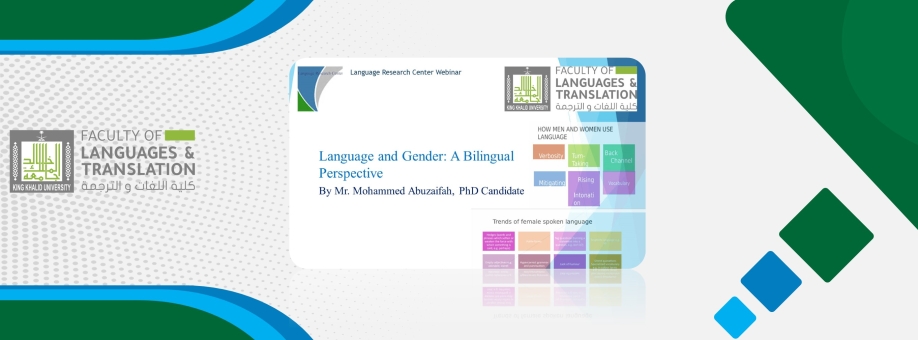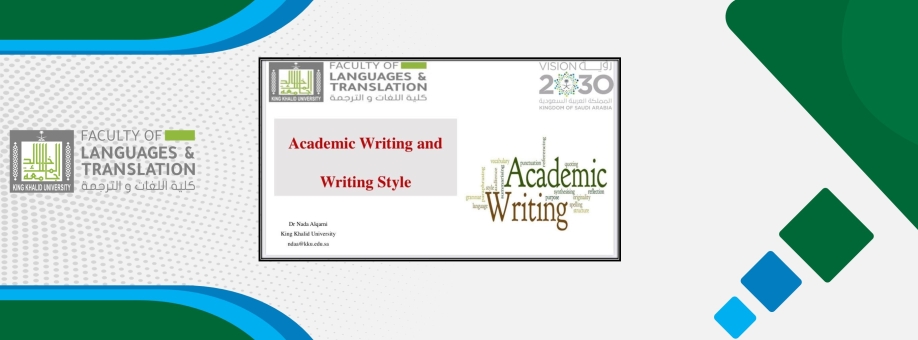News
On March 2, 2022, the Scientific Research Unit organized a virtual roundtable discussion about translation.
The discussion started by highlighting the significance of translation and translation studies as a field that deals with theory, description, and application of translation. The moderator of the discussion, Dr. Amal Metwally, introduced the field as an interlingual transfer and as intercultural communication. She further pointed out that translation studies can also be described as an interdiscipline, which touches on other diverse fields of knowledge, including cultural studies, comparative literature, linguistics, semiotics, rhetoric, technology in translation, and many other fields.
The moderator then introduced the speakers who are lecturers and promising researchers who achieved great success and accomplished their MA in translation in prominent universities during their scholarships.
Ms. Asma Alahmari, a lecturer at the Faculty of Languages and Translation, talked about her research in translation and her dissertation entitled "Comprehensive Text Analysis of the Arabic Translation of The Alchemist by Paulo Coelho". She discussed the discipline of translation versus the professional practice of translation. Ms. Alahmari also referred to the significant methods to measure the quality of translation and raised a question about "the voice of the translator". She also highlighted some examples from her own experience as an MA student and researcher at the University of Birmingham from 2019 to 2020.
The second speaker is Ms. Raghad Alqahtani, a lecturer at the College of Science and Arts, Ahad Rufaidah. Ms. Alqahtani also got her MA in Translation Studies from the University of Birmingham in 2019 and 2020. Her MA thesis is entitled “An investigation into Translation Studies Curricula at Postgraduate Level in Terms of Students’ Needs Market Demand: The Case of Saudi Arabia’s KKU and KSU”. In her research, she examined the status of translator training in Saudi Arabia by choosing two translation postgraduate programs (i.e., KKU & KSU). She asserted that the results of her study showed that the two programs were compatible with some observations. The study indicated that the majority of the students expressed a level of satisfaction with the programs as a whole. She added that students’ satisfaction was coupled with some comments indicating that curricula developers must consider some improvements. When asked about translation and technology, she confirmed that according to her study, students’ responses to translation technologies express a severe weakness in its integration in translator training programs.
Then the discussion went to the third speaker, Ms. Rafif Najmi, a lecturer at the Faculty of Languages and Translation, who got her MA in translation from the University of Leeds. In answering the question, "Why did you go for a project and not a dissertation?" Ms. Rafif indicated that it was one of "the toughest decisions", as she said. She clarified that many universities in the UK that have translation programs provide the options of either a dissertation or a translation project. She stated that she thought about focusing entirely on the project because it is more connected with the field of translation and as a future Ph.D. candidate. She needed to experience the practical side of translation before exploring its theoretical part. She also added that choosing a project won’t affect the Ph.D. approval. A lot of the students back then who went for the project are now Ph.D. students, and that didn’t stop them.
The interesting discussion guided the moderator to ask her about her project topic. Ms. Rafif Najmi indicated that her project involves a long annotated translation. She has to choose a book that has never been translated before and translate 8 to 10 words of the book. Her choice was "Master Your Emotions: The New 5-Step System to End Anxiety, Defuse Anger and Defeat Depression & Negative Thinking". She pointed out that after translation, an introduction that must involve an overview of the book, author and publisher, source text analysis, text genre, type, and function, register, the rationale (i.e., why have you chosen that book in particular), target readership, strategic approach, and a commentary should be written.
Ms. Najmi also referred to many challenges she faced while working on her project, including literary and psychological aspects of the source text genre, the issue of equivalence, religious and ideological backgrounds of TL readership, the cultural differences between cultures, and the view of the ST through the eyes of the TL readers. Another issue was the rendering of idiomatic expressions that are abundantly dispersed around books of this genre.
The discussion, which was mainly designed for translation students, was also attended by staff members who are interested in translation and translation studies. To view the speaker lineup, please click here.
The moderator of the discussion got positive feedback from many students on the roundtable discussion. Some of these views are included here:
"It was a wonderful discussion. It was a supportive discussion that helps us to continue our study in translation and take it as our aim. I think we need more discussions like this to take our plans and chance in a great way". – Khairiya Abdullah Ali
"Ms. Asma Alahmari, Ms. Rafif Najmi, and Ms. Raghad Alqahtani spoke about their experiences and their plans. They talked about some of the difficulties they faced and how they dealt with them. It was a good discussion and helps us so much". – Manar Ayied
"It was a very helpful discussion for us as students of the Faculty of Languages and Translation, and I hope it will be repeated many times with different members". – Shaima Abdullah
"It was such a great discussion which helped me understand more things about what I should do with my journey in translation after graduation. I really appreciate that such discussion took place and was very thankful for Dr. Asmaa, Dr. Rafif & Dr. Raghad’s answers, and Dr. Amal’s questions and lovely presenting. I would love to attend more of these discussions" – Rahaf Mukhtar
Date: 3/10/2022
Source: Dr. Amal Mewally, Head of Scientific Research Unit - Women's Section
Ms. Sharmin Siddiqui presented a paper titled "Enhancing Communicative Competence in English: Some Needs to Be Addressed" at a webinar organized by the Language Research Center on March 02, 2022. She highlighted the notion, components, strategies, and issues related to communicative competence.
The presenter referenced different scholarly views (Widowson, Brown, etc.) on communicative competence. Based on the scholarly opinions, she explained the fact that proper knowledge of a language is beyond the learners' ability to understand, read, write and speak. The proper competence is not fulfilled unless the learners' knowledge has its communicative effect. She also emphasized the real-world application of the target language, which is something closely associated with communicative competence. She added the intriguing phenomenon that communicative competence among students in a foreign or second language is more complex than we like to think.
Siddiqui highlighted the controversy over the notion of communicative competence mentioning the fact that Chomsky was the first proponent to distinguish between the lexical items – performance and competence. Chomsky, she added, clearly termed the former as the knowledge of various grammatical rules and the latter as successful communication. Hymes added socio-cultural factors to this concept, said Siddiqui.
Siddiqui explained in detail the four components of communicative competence (Sauvignon 1997) – discourse competence, strategic competence, grammatical competence, and sociolinguistic competence. These four can be the basis for curriculum design as well as classroom practice. There is a need for special hours to provide students with facilities and guidance for their proper improvement.
When it comes to issues associated with communicative competence, she added lack of linguistic and background knowledge, inability to organize ideas and express oneself, foreign language inhibition and anxiety, shyness, interlanguage errors, overgeneralization, excessive use of the native tongue, and limited teaching time are some of the main problems impeding the development of communicative competency among English language learners.
Siddiqui concluded that having the proper communication skills would equip learners with confidence and the ability to express themselves effectively. Constant and systematic research is needed to understand how to help students achieve communicative competence fully.
The webinar was very interactive and a great success with both male and female faculty members' active participation.
Date: 3/5/2022
Source: Mohammad Adil Siddique
أقام نادي The English Club بكلية اللغات والترجمة بأبها بالتعاون مع عمادة شؤون الطلاب لشؤون الطالبات
تمثيل مسرحية لكاتب مشهور من التسعينات بعنوان Pygmalion. وذلك في يوم الخميس الموافق ١٤٤٣/٧/٣٠ هـ من ١١-١٢.
حيث تضمنت المسرحية ٩ مشاهد ولكل مشهد ديكور وازياء مختلفة. صممت طالبات النادي أزياء وديكور كل مشهد وتنقلت الطالبات بين المشاهد بكل سلاسة.
تقسمت المهام بين عضوات النادي كالتالي: (مخرجة وهي الطالبة التي حرصت على تدريب الممثلات مع مشرفة النشاط، ممثلات، خلف الكواليس، مصممات ازياء وديكور، مسؤولات عن الميك أب، مسؤولات التنظيم والضيافة خلال المسرحية، و راوي المسرحية التي تتحدث بين المشاهد حتى يتم تغيير ديكور المشهد التالي، ومسؤولات عن الدعوات والإعلان للمسرحية. )
تم الاعلان والترويج للمسرحية وتصميم بطاقات دعوة، كما تم الاجتماع بالطالبات الممثلات عدة أيام للتدريب والمناقشة.
حضر المسرحية ١١ عضو هيئة تدريس وقرابة ١١٢ طالبة وموظفة.
مشرفة النشاط: أ. مرام المالكي
رائدة النشاط: هند أبو داسر
Video Link 1
Video Link 2
Video Link 3
أقام نادي The English Club بكلية اللغات والترجمة بأبها بالتعاون مع عمادة شؤون الطلاب لشؤون الطالبات
فعالية "رحلة حول العالم”
“Tour Around The World”
وذلك في يوم الأربعاء ١٥/٧/١٤٤٣ هـ من ٩-١٢.
تضمنت الفعالية أركان عدة بثقافات مختلفة مبتدأة محليًا بركن عسير (قمم وشيم) إلى اسكتلندا و إيطاليا واليابان و كندا و أمريكا. عرضت الطالبات الدول وثقافاتها المتنوعة بطريقة جاذبة لتأخذ الجميع بجولة حول العالم تحت سقف كلية اللغات والترجمة، حيث تضمن كل من الأركان الأطباق الرئيسية للدولة و عرض كلمات من اللغة الرسمية وترجمتها و أهم معالم وجامعات الدولة وماذا تشتهر به ونبذه عن تاريخها. كما كان في كل ركن طالبات متحدثات باللغة الانجليزية يتحدثن عن سبب اختيارهن للدولة وأهم المعلومات عنها. من ضمنها ركن عسير.
حضر بحدود ٣٤٠ طالبة وأعضاء هيئة تدريس وموظفات.
مشرفة النشاط: أ. مرام المالكي
رائدة النشاط: هند أبو داسر
On February 16, 2022, Mr. Mohammad Adil led a dynamic workshop titled "A Practical Approach to Aligning Course Learning Outcomes with Tests and Other Assessment Tools." This timely workshop, organized by the Language Research Center, provided a deep dive into methods for effectively measuring course learning outcomes, stressing the significance of advance planning for outcome alignment.
Initiating the session with an engaging brainstorming exercise, Adil presented participants with a sample course report emphasizing learning outcome measurement. Participants were then tasked with identifying potential issues with the demonstrated measurement in the report, sparking a lively exchange of ideas.
Adil highlighted the necessity for instructors to measure each learning outcome based on distinct tasks. He explained that when a comprehensive test, such as a final exam, aligns with multiple learning outcomes, the measurement should be based on points achieved per task rather than the total exam score. He meticulously demonstrated how final exam tasks could be precisely aligned with specific learning outcomes and how these could be effectively and accurately measured.
In addition, Adil briefly discussed potential approaches to crafting assignments based on specific learning outcomes. Emphasizing a proactive strategy, he advised coordinators to develop and share alignment plans with instructors at the beginning of a course to prevent confusion and misalignment.
The practical and insightful workshop was well-received and deemed a great success. A recording of the event, titled "CLO Alignment Webinar," is available for further reference and revisiting the rich discussions of the workshop.
In a seamless continuation of the training session explained above, the Development and Quality Unit later in the day further highlighted the dedication to enhancing educational standards. This session, pivotal in strengthening our assessment process, emphasized:
Effective Use of Moderation Checklist: Reinforcing its role in ensuring fair, valid, and reliable assessments, aligned with learning outcomes.
Review of Past Exams: Analyzing previous results to refine assessment strategies, ensuring alignment with educational goals.
Phases of Assessment Moderation: From pre-assessment checks to post-assessment evaluations, ensuring thoroughness and fairness in line with Bloom's Revised Taxonomy.
Application of Bloom's Taxonomy: This ensures a diverse range of cognitive skill assessments, from basic understanding to complex analysis.
This comprehensive approach, anchored by past assessments and the moderation checklist, significantly elevates the consistency, fairness, and educational alignment of our courses and program assessments.
Translation Unit at FLT has subtitled into English three YouTube videos about recent national topics (the Saudi Founding Day, the difference between the Saudi Founding Day and National Day, and Aseer Strategic Development Plan), aiming to provide much-needed information for non-Arabic audience locally and globally and familiarize them with the remarkable national developments in Saudi Arabia. Enjoy watching!
قامت وحدة الترجمة في كلية اللغات والترجمة بترجمة ثلاثة مقاطع من اليوتيوب إلى اللغة الإنجليزية حول مواضيع وطنية حديثة (يوم التأسيس السعودي، والفرق بين يوم التأسيس السعودي واليوم الوطني، وخطة التنمية الاستراتيجية لمنطقة عسير). وتهدف الترجمة إلى توفير المعلومات اللازمة للناطقين بغير العربية محليًا وعالمياً واطلاعهم على التطورات الوطنية الرائعة في المملكة العربية السعودية. مشاهدة ممتعة نرجوها لكم!
Click the links below to view the videos.
Founding Day
Founding Day vs. National Day
Aseer Strategic Plan
Date: 2/15/2022
Source: Translation Unit Director, Dr. Eisa Asiri
أقام نادي The English Club بكلية اللغات والترجمة بأبها بالتعاون مع عمادة شؤون الطلاب لشؤون الطالبات
دورة ضمن برنامج 2030 We’re Coming!
بعنوان "نصائح للمقبلين على الابتعاث "
"Friendly Advice before you Study Abroad“
والتي قدمتها عضو هيئة التدريس الاستاذة أسماء الاحمري في مكتب النشاط وتم بثه عبر الزوم لبقية الطالبات.
تضمنت الدورة عدة معلومات مهمة لمن ترغب بالابتعاث وإكمال الدراسات العليا، منها كيفية اختيار الدولة المناسبة والتخصص وطرق البحث عن الجامعات المعتمدة وآلية التسجيل في مواقع الجامعات وطلبات القبول ومتطلبات البعثة والسفارة ودول الابتعاث وكذلك الاختبارات الدولية. وقد فاد ذلك الكثير من الطالبات المقبلات على التخرج والراغبات في الابتعاث. كما استقبلت عضو هيئة التدريس استفسارات الطالبات والاجابة عليها مع ذكر مواقف ونصائح لتجارب خاصة.
حضرت ٢٩ طالبة في مكتب النشاط و ٨ طالبات عبر الزووم.
مشرفة النشاط: أ. مرام المالكي
On Tuesday, February 8, 2022, at 8 pm, four Bachelor of Arts in English program rising seniors, and student representatives of the King Khalid University 2021 Online Summer Program with Monash University, delivered an Alumni Unit webinar entitled "Summer Course Experience: Monash University".
Beginning the webinar as the moderator, Rayan Hassan Alfaifi, a student at the Faculty of Languages and Translation's 4-week 2021 online summer program titled "English Across Cultures and Intercultural Awareness" that ended on 19 August 2021, explained that the program translated into a deeper understanding of the English language and culture. Rayan said: "We thought that why wouldn't we make a full summary of this program and give it to all students through this webinar. This is the whole idea of this webinar." He then introduced the thematic points of the webinar, including fun facts about Monash University, Australian culture & language, language and culture, teaching and learning culture, cultural awareness, intercultural information, bilingualism, native speakerism, pedagogy and fairness, and research tips.
"We were thrilled to offer this opportunity to our top students, especially during the pandemic," said Dr. Abdullah Al-Melhi, Dean at the Faculty of Languages and Translation. "What's remarkable about the online summer program is how KKU's and Monash's high-caliber faculty collaborated to design a curriculum that fit the needs of our students," said Dr. Abdulrahman Almosa, Vice Dean of Academic Development & Quality at the Faculty of Languages and Translation
Hind Mufleh Abudaser, Jana Muneer Saeed, Rayan Hassan Alfaifi, and Faisal Mohammad Asiri then began the informative part of the webinar. They introduced participants to the origins of Australian culture, the colorful vocabulary of Australian English, examples of diminutives, the intersections of language and culture, language as a code, language as a social practice, approaches to learning culture, the four categories of cultural awareness, the concepts of interculturalism and the spaces they are defined in, steps to becoming an intercultural learner, bilingualism, multilingualism, fractional and holistic views, code-switching, translanguaging, the myth of ambilingualism, English as an international language (EIL), the fallacies of native speakerism, pedagogy and fairness, equality vs. equity, and research tips.
The Summer Language Program is a recent development managed by the Faculty of Languages and Translation and its international partners. It serves to enrich gifted and talented students with extracurricular activities in a variety of fields to develop their abilities and skills. Special thanks go to the Alumni Unit for communicating and involving alumni in events and activities. To watch a recording of the event, please see the embedded video below.
Summer Course Experience: Monash University
Date: 2/13/2022
Source: Faculty of Languages and Translation
For a related story, click here.
Dr. Abdulwahid Al Zumor of the Faculty of Languages and Translation attended a three-day training for international experts in Higher Education Quality Assurance (31/01/2022, 1 & 4/02/2022) by the Accreditation Agency for Study Programmes in Engineering, Informatics, Natural Sciences and Mathematics (ASIIN). Day 1 was an Introduction to ASIIN and its International Network of Quality Assurance in Higher Education. The participants were also introduced to the Accreditation Procedures and the Peer Review Principles, how reviewers should behave as expert peers, and the associated tasks, objectives, and challenges. The last training topic of Day 1 was content and interpretation of the European Standards and Guidelines (ESG) I-II for external and internal quality assurance.
Day 2 program focused on Self-Evaluation Report and the Accreditation Criteria: how to analyze and assess HEI’s self-evaluation, the accreditation criteria and typical pitfalls, procedural guidelines for the accreditation of degree programs, subject-specific criteria; defining and assessing learning outcomes. The program of Day 3 was practically oriented. The participants were involved in the discussion of the practical task assigned to them between the 1st and 4th of February. They received individual feedback from the consultants on the analysis and formulation of questions using an exemplary self-evaluation report. The last part of the program was a role-play and simulated audit activity with possible scenarios for on-site discussions.
At the end of the training, Dr. Al Zumor was awarded a certificate of completing all training requirements for an international expert in Higher Education Quality Assurance.
ASIIN is a global leader in Quality Assurance in Higher education based in Germany and has contributed to the accreditation and evaluation of 5669 study programs in 304 HE institutions in 44 countries worldwide, including Saudi Arabia.
Date: 2/11/2022
Source: Faculty of Languages and Translation
At the beginning of the Spring 2022 semester, E-Learning Supervisor, Mohsin Raza Khan, delivered an e-learning practitioner certification course open to all faculty members. The importance of instructional design training and an enhanced learning environment for students is well known to all colleges of the university. "The focal point of the two-week practitioner course was to ensure alignment between assessments and learning outcomes. Fifty-eight faculty members registered in the course, and nearly half were able to complete it on time successfully. E-Learning Deanship Training Manager, Ali Alaosi, was instrumental in ensuring smooth delivery of the course, and we thank him for his support," said Khan.
The primary objectives of the course were to improve student learning, engagement, interaction, and quality learning. These objectives were solidified by the core foundation of the program that participants would be able to:
Create content items to present a variety of learning activities to enhance student learning.
Deliver authentic assessments to evaluate student knowledge in a variety of meaningful ways.
Use Blackboard communication tools to promote interactions between the student and instructor, the student and course content, and the student and peers.
Effectively utilize Blackboard Collaborate™ tools to increase student engagement by providing a means to share and create knowledge.
Date: 2/9/2022
Source: Faculty of Languages and Translation
أقام نادي The English Club بكلية اللغات والترجمة بأبها بالتعاون مع عمادة شؤون الطلاب لشؤون الطالبات فعالية Old Games are Back.
وذلك في يوم الأحد الموافق ١٤٤٣/٦/٥ هـ من الساعة ٩-١٢.
حيث قام النادي بتجهيز ألعاب يدوية وإلكترونية للطالبات في مكتب النشاط ليكون محطة للترفيه بين المحاضرات وكذلك فرصة للتطبيق العملي و استخدام اللغة الإنجليزية في بعض المسابقات التنافسية كمسابقة البحث عن الكنز والتي نُفذت على جولتين: الجولة الاولى زُودت الطالبات بألغاز باللغة الانجليزية متسلسلة في البهو الداخلي بحيث أن حلها يوصِلهم إلى مكان الكنز وهو عبارة عن قسائم شرائية من جرير.
أما الجولة الثانية فكانت في الفناء الخارجي مستخدمين الاعمدة الملونة بمثابة خريطة للمتسابقات، بحيث يتم حل الالغاز على تسلسل الالوان، وبذلك تصل الطالبة الأسرع إلى العمود الأخير حاصلة على الكنز.
حضر الفعالية ٤٨ طالبة.
مشرفة النادي: أ. مرام المالكي
رائدة النادي: هند أبو داسر
In January 2022, His Excellency the President of King Khalid University, Prof. Falleh Al-Solamy, recently issued a decision to establish the Translation Unit (TU), under the supervision of the Faculty of Languages and Translation. In addition to the remarkable developments that King Khalid University has witnessed in academic, scientific, technical, and societal areas, to name a few, TU is another of the university’s initiatives aligned with the Kingdom’s Saudi Vision 2030. This unit was established with the aim of enhancing the university’s role in sharing knowledge, scientific and otherwise, by making it accessible to other cultures and languages. It also highlights the remarkable status of the Arabic language and reinforces its role in a global civilization.
Dean Abdullah Al-Melhi commented that “the university seeks through this unit to contribute to achieving the goals and expectations of Asir region development strategy, and spreading the original culture of the Asir region, thus enriching the translation content locally and internationally and highlighting the Saudi identity.”
Translation Unit Director, Dr. Eisa Asiri, stated that “TU is an important milestone initiative towards achieving the long-awaited objectives of this unit, including but not limited to, progressing all forms of translation and advancing their vital roles in enriching and disseminating knowledge among languages and cultures, contributing to the achievement of the strategic development plan for the Asir Region by disseminating its authentic culture regionally and globally via translation, and building up community partnerships aimed at achieving the university's mission to provide outstanding community services."
If you wish to contact the Translation Unit, please choose any of the following options:
By tel: +966 53 327 4414 (Sunday - Thursday 9 am to 2 pm)
By email: ealeisa@kku.edu.sa
Date: 2/1/2022
Source: Faculty of Languages and Translation
On December 22, 2021, the Measurement & Evaluation Unit — led by Abdullah Al-Rezgi — organized a webinar under the supervision of the Measurement and Evaluation Center (MEC) on end-of-semester tasks to complete in the Statistical Package for the Social Sciences (SPSS). Over a dozen teachers in the Faculty of Languages and Translation and consultants from the Measurement and Evaluation Center attended. The purpose of the webinar was to provide step-by-step instructions along with some information on the interpretation of skewness and the Pearson correlation coefficient.
Hassan Costello began the webinar demonstrating how to do data cleaning in SPSS, from converting data types, removing duplicates and outliers in data view to why missing values appear. He stressed the need to watch out for numeric values being designated as string variables in variable view. Costello then showed the step-by-step procedures to take in descriptive statistics, correlation analyses, the Independent Samples t-Test, and One-Way ANOVA. While he mainly focused on SPSS, he also mirrored all procedures in Jeffrey's Amazing Statistics Program (JASP). "Using JASP is only for staff members who do not have the SPSS program. With the implementation of the Assessment Gourmet Platform, analysis will be automatic in the coming semesters," he said. Towards the end of his part of the webinar, Costello spoke briefly on skewness and how that illustrates deviation from the symmetrical bell curve. He also noted specific numerical categories in the significance level (alpha) of the Pearson correlation coefficient, explaining that if the correlation between the year work and the final exam is not significant, instructors should justify the lack of correlation.
Dr. Mazeegha Al-Tale', who also serves as an assistant to the Measurement & Evaluation Center director, then provided more context and theoretical information on the three different types of analysis. She noted the similarities and differences among descriptive statistics, correlation analyses, parametric tests, and nonparametric tests. Along with a brief but very comprehensive summary on how to interpret results, Dr. Al-Tale' explained that statistical analysis will help our decision-makers improve policies and the learning process. She then pivoted to discuss the recently adopted Assessment Gourmet Platform at King Khalid University, noting that it is important to write course learning outcomes properly because each question of each exam will have to be related to a specific course learning outcome (CLO). Moreover, Dr. Al-Tale' explained that each question will also be related to a topic and tagged with a level of difficulty. "In the coming semester, we will conduct workshops on how to deliver your exams using the Assessment Gourmet Platform, which is obligatory for all faculty members in all colleges. In this platform, you will be able to assess and analyze results automatically by following certain steps," she concluded. Please click here to view a recording of the event.
As an interesting aside from our main story, earlier in the day, Hassan Costello, took a pivotal step towards shaping the future of the Bachelor of Arts in English program. His journey through various high schools in Abha and Khamis Mushait was far from a series of routine academic engagements. Instead, Costello's mission was to engage with educational administrators to solicit their insights on the key components of the program: its mission statement, graduate attributes, program learning outcomes, and the specific learning outcomes of several major courses.
In these insightful exchanges, Costello laid out the core aspects of the program and encouraged administrators to share their perspectives. This dialogue was essential; it was not merely about conveying information but about fostering a collaborative environment where the subtleties of educational goals could be openly discussed. The aim was to ensure that the program's mission not only aligns with the needs of its direct stakeholders, the students, but also resonates with those who guide these students before they enter university. The feedback obtained from these sessions is invaluable, steering the program towards a more integrated and comprehensive approach in its upcoming revision, one that aligns the aspirations of future university students with the evolving demands of the global academic and professional landscape.
Date: 12/22/2021
Source: Faculty of Languages and Translation
In November 2021, Dr. Mazeegha Al-Tale' received a certificate of appreciation from the National eLearning Center (NELC) for reviewing a FutureX learning management system course as part of NELC's ASAS initiative. FutureX, which launched in late October 2021, connects institutions throughout the Kingdom together to support the human capital development objectives of Vision 2030. "It was an honor to be selected as a course reviewer for material appropriateness. While many MOOCs focus on getting knowledge out to as many people as possible, FutureX wants to make sure the knowledge is also useable. EdX, Coursera, and FutureLearn are some of the more well-known partners working with FutureX, and we fully expect an improvement in human capital development through online learning," said Dr. Al-Tale'.
Date: 12/24/2021
Source: Faculty of Languages and Translation
In November 2021, Mohsin Raza Khan received a certificate of appreciation from the National eLearning Center (NELC) for reviewing a FutureX learning management system course as part of NELC's ASAS initiative. FutureX, which launched in late October 2021, connects institutions throughout the Kingdom together to support the human capital development objectives of Vision 2030. "FutureX and the ASAS initiative have several interesting plans in place. In my role as a course reviewer, I leveraged my experience as a QM master reviewer to ensure best practices were found in the MOOC I reviewed. Many of the fundamental best practices and areas reviewed are also based on the E-Learning Practitioner course that is run by the Deanship of E-Learning on an annual basis," said Mohsin.
Of noteworthy mention, Mohsin also led the E-Learning practitioner certification course in November 2021, which is implemented on an annual basis by the Deanship of E-Learning. In that course, dozens of participants throughout King Khalid University learned how to improve student engagement, interaction, and quality learning. These objectives were solidified by the core foundation of the program that participants would be able to:
Create content items to present a variety of learning activities to enhance student learning.
Deliver authentic assessments to evaluate student knowledge in a variety of meaningful ways.
Use Blackboard communication tools to promote interactions between the student and instructor, the student and course content, and the student and peers.
Effectively utilize Blackboard Collaborate™ tools to increase student engagement by providing a means to share and create knowledge.
Date: 12/24/2021
Source: Faculty of Languages and Translation
Dr. Ahlullah Siddiqui S/O Mohammad Urwatullah Siddiqui was born on February 24, 1973, to a noble and humble family in Allahabad, UP, India. He died of cardiac arrest on December 9, 2021, in Abha, KSA, at the age of 48 years. He is survived by his wife, three daughters, and a son. His eldest child is a 17-year-old daughter, and all his kids are schoolgoers. Dr. Siddiqui obtained his primary, secondary, and university education from reputed institutions. Since his school days, he was found to be a possessor of certain distinctive traits uncommon among his classmates. He was not only sound academically, but he exhibited all his potentials in extracurricular activities also.
Dr. Ahlullah Siddiqui did his masters in linguistics and literature, M.Phil in English Literature, and a Ph.D. in Sociolinguistics. He also had the opportunity to join as a Fulbright scholar in the Professional Development Programme for English lecturers at the University of California, Los Angeles, and Washington D.C.
Dr. Siddiqui has worked in several capacities from time to time. He started his teaching career by teaching English language and literature to adult learners, under the National Open Schooling Program, Delhi, from 1999 to 2004. He also taught English language and literature to pre-university students, at a historical college, under the government of Delhi from 2004 to 2008.
He joined King Khalid University Abha, KSA, in October 2008. Since then, he taught English as a foreign language at the undergraduate level till his death with zeal and zest in the Department of English, Faculty of Languages and Translation. He also served as a coordinator for the English Language Center, King Khalid University Abha, KSA.
Dr. Siddiqui has to his credit, several research articles published in renowned journals covering various themes related to linguistics and literature. He has actively attended several conferences and seminars and has presented quite a good number of research papers related to his specialization.
It was his positive disposition, his reflective ways of operating, and all of the character traits that made him so special. Dr. Siddiqui’s questions never went unanswered. It was his humble and amicable nature that made him look different from his contemporaries.
It is indeed the hardest thing to forget someone who means the world to you. Forgetting a friend like him is like forgetting our own soul – it is just not possible! His sudden disappearance has created a vacuum among us. He will be remembered with warm thoughts and memories.
Having him with us was having great support, a great colleague, a caring brother, and a loving father.
Date: 12/17/2021
Source: Faculty of Languages and Translation
On November 29, 2021, Dr. Mazeegha Al-Tale' led a training webinar for undergraduate and graduate programs in the Faculty of Languages and Translation titled 'Designing CLOS for EFL Courses'. In attendance were around 35 course coordinators and instructors from numerous campuses.
Dr. Al-Tale' began the webinar by explaining the benefits of course learning outcomes (CLOs) to both teachers and students. She stressed the need for teachers to ensure the consistency and alignment of outcomes, materials, methods, and activities because that will help students learn more effectively.
When going through the difference between objectives and outcomes, she explained that course objectives describe an intended state and is more general and open to more than one interpretation. Dr. Al-Tale' then mentioned that learning outcomes are specific and not open to more than one interpretation. "There are 7 characteristics of writing good CLOs. They should be topic-related, domain-related, measurable, specific, concise, clear, and aligned," she said. She then showed the 4 criteria to consider when writing CLOs, stressing CLOs need to be aligned with program learning outcomes, course objectives, content, teaching methods, teaching activities, and assessment tools. At the conclusion of her presentation, there was a lively question and answer session where participants had the opportunity to discuss course learning outcomes and how they align. Please click here to view a recording of the event.
Date: 11/29/2021
Source: Faculty of Languages and Translation
On November 27, 2021, Dr. Abdulwahid Al Zumor led a training webinar for undergraduate and graduate programs in the Faculty of Languages and Translation titled 'Course Learning Outcomes'. In attendance were around 55 course coordinators and instructors from numerous campuses.
Dr. Al Zumor began the webinar by explaining that course learning outcomes (CLOs) are the brain and heart of the course specification. He stressed the need to utilize the models provided in level 6 of the NQF-KSA because it acts as a key nexus that reinforces and consolidates relationships between education and training on the one hand and the practical and realistic requirements of the labor market on the other. When going through the knowledge/understanding, skills, and values learning domains, he related that values also include autonomy and responsibility. "Effective learning outcomes are student-centered, measurable, concise, meaningful, achievable, and outcome-based," he said. He then showed examples of both well-written and poorly constructed CLOs, emphasizing the importance of quantifiable CLOs, whether direct or indirect. At the conclusion of his presentation, there was a call to action to write the main course objective from the instructor's perspective and to have a variety of assessments. Please click here to view a recording of the event.
Date: 11/27/2021
Source: Faculty of Languages and Translation
Mr. Mohammed Abuzaifah, a Ph.D. candidate, delivered a presentation based on research titled, "Language and Gender: A Bilingual Perspective". It was presented at a webinar organized by the Language Research Center on November 24, 2021. His main interest was how the English language is used by two different genders. He also tried to highlight the difference in terms of the Arabic language.
Abuzaifah, first explained the study of discourse and gender, which is an interdisciplinary endeavor shared by scholars of linguistics, anthropology, speech communication, and social psychology. He also mentioned how language was defined differently by scholars like Aristotle, Saussure, Bloomfield and Chomsky.
The researcher emphasized the fact that gender plays a significant role in the use of language. He explained the distinction between sex-related variability and gender-related variability. The former is related to psychological, neurological and biological factors while the latter to society-constructed gender roles.
Abuzaifah highlighted the history of gender and language studies mentioning a book titled, "Language and Woman's Place" written by Robin Lakoff (1972), which was primarily based on feminist theory and the women's liberation movement. This book showed the difference between men and women in terms of language usage. The researcher also highlighted the difference in terms of the spoken language features such as turn-taking and backchanneling etc. He also exemplified the difference in respect of word choice and intonation.
The researcher concluded that women talk more than men in general, and they are more polite but interrupt more often. Men, on the other hand, swear more and express their dominating behavior while talking but interrupt less.
The webinar was very interactive and a great success.
Date: 11/24/2021
Source: Mohammad Adil Siddique
In the academic writing and writing style overview training session on November 23, 2021, Dr. Nada Alqarni started with an introduction to what academic writing style refers to and the importance of good academic writing. It also stated what it means to write in an academic style. Dr. Alqarni highlighted that the purpose of academic writing is to communicate complex ideas in a way that makes them less likely to be challenged. She mentioned that academic writing should be formal and can be planned (like a mini-essay) using the PEAL format.
The following sections described that academic writing has a purpose that focuses on what one intends to convey and decides the audience for whom it is intended to write. Moreover, it has an appropriate style that is different from any other form of writing. It also gave details about language and register, stating that academic writing uses a formal register.
Dr. Alqarni also focused on the structure followed in academic writing, including introduction, body, summary, and conclusion. Next, she mentioned some problems to avoid. She also discussed structure and writing style, where she highlighted strategies to improve academic writing and evaluate the quality of writing.
She concluded the session by summarizing what academic writing requires, which included planning, organization, accuracy, formality, objectivity, and the use of clear sentence structure.
The session ended with comments and discussions. Faculty members, M.A, and Ph.D. students attended the session.
Date: 11/23/2021
Source: Tanzina Halim, Member, SRC


